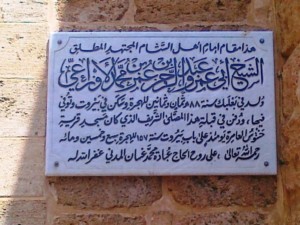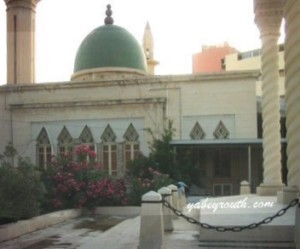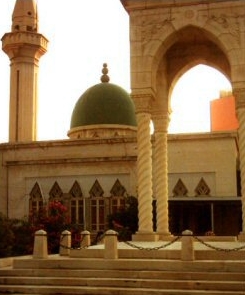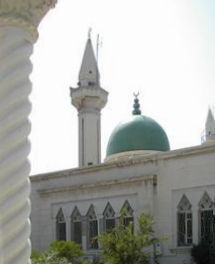Bio: Imam al-Awza´i
`Abd al-Rahman ibn `Amr ibn Yuhmad Abu `Amr al-Awza`i
الإمام عبد الرحمن الأوزاعي
b. 88 – d. 158 H. in Beirut, Libanon (707 – 744 CE) tabi´i
radiya Allah anhu
﷽
English
Al-Awza`i
By Dr. G.F. Haddad
`Abd al-Rahman ibn `Amr ibn Yuhmad Abu `Amr al-Awza`i (88-158), Shaykh al-Islam, the Wise Scholar of the People of Sham, one of the mujtahid imams of the Salaf along with the Four Imams, Sufyan al-Thawri, al-Tabari, Dawud al-Zahiri and others, the first – with Ibn Jurayj and Abu Hanifa – to compile the Sunna of the Prophet — Allah bless and greet him — and the Companions under fiqh subheadings. Born orphaned and poor in Ba`labak and raised in al-Kark in the Bekaa valley, he came to live in the area known as – and populated by – “the variegated tribes” (al-Awza`) in Damascus then moved to Beirut where he remained garrisoned until his death, his fame having spread to the entire Islamic world of his time. One of those who combined assiduous worship with science and the affirmation of truth, he is considered a Proof in himself (hujja) as a narrator, known for his superlative understanding of the Law, great erudition, and piety. Al-Shafi`i said: “I never saw a man whose fiqh resembled his hadith more than al-Awza`i.”1
He narrated from a host of Tabi`in, among them `Ata’ ibn Abi Rabah, Abu Ja`far al-Baqir, `Amr ibn Shu`ayb, Makhul – whom he surpassed in knowledge, – Qatada, Rabi`a ibn Yazid al-Qasir, Bilal ibn Sa`d, al-Zuhri, Yahya ibn Abi Kathir – his first shaykh,- `Abd al-Rahman ibn al-Qasim, `Ata’ al-Khurasani, `Ikrima, `Alqama, Ibn al-Munkadir, al-Walid ibn Hisham, Muhammad ibn Sirin, Nafi` – Ibn `Umar’s freedman – and many others. From him narrated his two shaykhs al-Zuhri and Yahya ibn Abi Kathir, Shu`ba, al-Thawri, Malik, Sa`id ibn `Abd al-`Aziz, Isma`il ibn `Ayyash, Baqiyya, Yahya al-Qattan, and many others.
Al-`Abbas ibn al-Walid said: I never saw my father admire anything in the world as much as he admired al-Awza`i. He used to exclaim about him: “Glory to You! You do what You wish.” O my son! Kings are powerless to discipline themselves and their own children the way that al-Awza`i disciplined himself. I never in my life heard him say an excellent word except the listener was bound to observe that it applied to him. Nor did I ever see him laugh without restraint. Whenever he addressed the subject of our return to our Maker, I would say to myself: I wonder, is there one heart in this gathering that is not weeping?
Al-Hiql said: “Al-Awza`i gave replies covering about seventy thousand issues.” `Abd al-Rahman ibn Mahdi said: “The People (al-nas) in their time were four: Hammad ibn Zayd in al-Basra, al-Thawri in al-Kufa, Malik in al-Hijaz, and al-Awza`i in al-Sham.”2 Isma`il ibn `Ayyash said: “I heard people say, in the year 140, that in our day the wise scholar of the Umma is al-Awza`i.” When the latter came to Mecca, Sufyan al-Thawri walked ahead of him shouting: “Open the way for the Shaykh!” Malik compared the two saying: “One of them [Sufyan] is more knowledgeable than the other, but is not fit to be the Imam [i.e. the Caliph], while the other [al-Awza`i] is.” This was also the opinion of al-Fazari, `Ali ibn Bakkar, and Ibn al-Mubarak.
He was fearless in telling the truth to princes. After massacring the Banu Umayya, the harsh king `Abd Allah ibn `Ali – al-Saffah’s uncle – summoned him and asked him in front of his court: “What is your opinion of what we have done?” Al-Awza`i related: “I thought to myself and decided to tell him the truth, bracing for certain death. I narrated to him the hadith: `Actions are only according to intentions.’3 He said: `What do you say about our killing the people of that dynasty?’ I narrated to him the hadith: `Killing a Muslim is forbidden except in three cases: adultery after marriage, apostasy after Islam, and unlawful manslaughter.’4 He continued: `Tell me about the caliphate, is it not our inheritance as stipulated by the Prophet — Allah bless and greet him?’ I replied: `Had this been the case, `Ali – Allah be well-pleased with him – would have never left anyone come before him.’ He said: `But what do we say about the treasury of the Banu Umayya?’ I replied: `If they were licit to them, they are illicit to you, and if they were illicit to them, they are even more illicit to you.'”
Al-Awza`i did not rise from his place of morning prayer until sunrise, and the sun did not pass the zenith except he was seen standing in prayer. Al-Walid ibn Mazyad said: “No-one surpassed him in intensity of worship.”Among his sayings:
* Marwan al-Tatari said that al-Awza`i said: “Whoever stands in prayer at night at length, Allah shall make the station of the Day of Resurrection easy for him.”
* Al-Walid ibn Muslim and `Abd Allah ibn al-Mubarak related that al-Awza`i said: “This science was noble, men would transmit it to one another, but when it spread to books, those other than its rightful custodians became involved with it.”5
* “Whoever holds on to the rare and unusual positions of the scholars has left Islam.” This is similar to Ibn `Abd al-Salam’s saying: “There is no good in one who over-maneuvers (yatahayyal) so as to impose his doctrine despite its weakness and the fact that his evidence is far removed from the truth – whether he interprets the Sunna, or the Consensus, or the Book – standing on bases that are neither right nor true, through corrupt figurative interpretations and rare responses.”6
* “The Book stands in greater need to the Sunna than the Sunna to the Book.” Ibn `Abd al-Barr said: “That is because the Sunna expounds the meaning of the Book (and not vice versa).”7
* Al-Walid ibn Mazyad said that al-Awza`i, asked about humility (khushu`) in prayer, replied: “Downcast gaze, lowering the wing of submission, and softness of heart which is sorrow and dread.” He also said: “I saw al-Awza`i, he was like a blind man due to his humility.”
* Al-Walid heard al-Awza`i define the naïve (al-ablah) as “he who is in blind ignorance of evil but acutely discerning of goodness.”
* “Whoever remembers death much, a little suffices him for livelihood; and whoever realizes that his utterances are counted as deeds, his speech becomes spare.”
* `Abd Allah ibn Ahmad narrated from al-Hasan ibn `Abd al-`Aziz from `Amr ibn Abi Salama al-Tinnisi that al-Awza`i said: “I saw myself as if carried up by two angels who camped me in front of the Lord of Power and Might. He said to me: `Are you my servant `Abd al-Rahman who commands good deeds?’ I replied: `By Your Power and Might! You know best.’ Then they descended again and brought me back where I first was.”
Among al-Awza`i’s notable rulings is that the thigh is part of a man’s legal nakedness in the mosque, but not in the bath.8
Muhammad ibn `Abd al-Rahman al-Sulami said: “I saw al-Awza`i, he was of above-average build, slim, somewhat swarthy, and he used henna.” He used to wear a round turban without a hanging extremity (`adhaba). Al-Dhahabi said: “In addition to his brilliance in the science and his foremost rank in works, he was also a master in the art of writing letters.” Four communities attended his funeral in Beirut: the Muslims carried his bier, followed by the Jews, the Christians, and the Copts. Yazid ibn Madh`ur said: “I saw al-Awza`i in my sleep and asked him: `Show me a level by which to draw near to Allah.’ He replied: `I did not see a level higher than that of the wise scholars of knowledge (al-`ulama’), and, after it, that of the grief-stricken (al-mahzunin).'” SAN 7:86-104 #1049.
_______________________
1 A reference to al-Awza`i’s faithful application of his knowledge in his life.
2 This is a notable example of the use of al-nas to mean the major ulamas.
3 Narrated from `Umar by Bukhari and Muslim.
4 Narrated from Ibn Mas`ud by Bukhari, Muslim, and in the Four Sunan; from `Uthman by al-Tirmidhi (hasan), al-Nasa’i, Ibn Majah, Ahmad, al-Hakim (4:350), al-Shafi`i in his Musnad, al-Bazzar in his Musnad; and from `A’isha by Abu Dawud. See al-Bayhaqi’s Kitab al-Murtadd in Ma`rifa al-Sunan (12:237-258).
5 This statement refers to the books which are passed on for circulation as in modern times, not to those used by the early narrators as mnemonic records when narrating. It is established that early hadith narrators did not narrate except from record, as demonstrated by M.M. Azami and others. ‘Abd Allah ibn Ahmad ibn Hanbal said: “I never saw my father narrate except from a book, save less than a hundred hadiths.” In al-Dhahabi, Siyar A`lam al-Nubala’ (9:457). The best source on the proof-texts for this fact is al-Khatib al-Baghdadi’s book Taqyid al-‘Ilm (“The Tethering of Knowledge”). This title is taken from Anas’s saying: “Tether knowledge with writing” (qayyidu al-‘ilma bi al-kitab). Anas also said: “We would not consider as knowledge the knowledge of those who did not write down their knowledge.” Taqyid (p. 96-97). See also al-Hakim al-Tirmidhi’s chapter entitled “Writing is the means to tether knowledge and preserve it from oblivion” in his Nawadir al-Usul (p. 39-41).
6 Ibn `Abd al-Salam, Al-Qawa`id al-Sughra (p. 144).
7 Narrated by al-Darimi and others and cited by Ibn `Abd al-Barr in Jami` Bayan al-`Ilm (2:1193-1194 #2351). and al-Shatibi in al-Muwafaqat (Salafiyya ed. 1343 4:10).
8 The rulings of the Four Schools agree that the definition of “nakedness” (`awra) for a man is all that is above the knees and below the navel front and back whether in public or private. Among the proofs for this is the Prophet’s — Allah bless and greet him — saying: “The [man’s] thigh is nakedness.” Narrated from Jarhad al-Aslami, `Ali, and Muhammad ibn Jahsh – with three sound chains according to al-Arna’ut – by Abu Dawud, Ibn Majah, Ahmad, Malik, al-Hakim (4:180-181), Abu Ya`la in his Musnad (#331), al-Tahawi in Sharh Mushkil al-Athar (4:401-406 #1697, #1699, #1700, #1704), al-Baghawi in Sharh al-Sunna (9:21-22), Ibn Hibban in his Sahih (4:609-611), and others. Al-Tahawi said in Sharh Ma`ani al-Athar (1:474): “Mass-narrated, sound reports from the Prophet — Allah bless and greet him — have reached us that the thigh is nakedness.” Al-Kattani cited it in Nazm al-Mutanathir.
Copyright As-Sunna Foundation of America
Türkçe
عربي
الإمام عبد الرحمن الأوزاعي
الإمام الحافظ إمام بيروت وسائر الشَّام والمغرب والأندلُس أبو عمرو عبدُ الرحمٰن بن عمرو بن يُحمد الأوزاعي، فقيه ومُحدّث وأحد تابعي التابعين وإمام أهل الشام في زمانه. أُضيف إلى ألقابه لقب إمام العيش المُشترك في لُبنان في العصر الحديث، لِما مثَّلته مواقفه في عصره من تسامح مع المسيحيين واليهود من أهل الشَّام، ولُقِّب بِشفيع النصارى لِموقفه الحازم في مُواجهة والي الشَّام والخليفة العبَّاسي أبو جعفر المنصور، اللذان عزما على إجلاء أهالي جبل لبنان المسيحيين بعد أن ثارت جماعة منهم وتمرَّدت على العبَّاسيين وشقَّت عصا الطاعة، فرفض الأوزاعي إجلاء هؤلاء كُلُّهم طالما أنَّ فئةً منهم فقط كانت من ثارت، ووقف بوجه الخِلافة بِعناد مُذكرًا أهل السُلطة بالعدل بين الناس وأنَّ خطأ فئة لا يستوجب مُعاقبة الجماعة، فأُبطل هذا القرار، وسلم أهالي جبل لُبنان من تعسُّف السُلطة، وحفظوا لِلأوزاعي جميله.[1]
على الأرجح وُلد الأوزاعي في بعلبك، وعاش فترة من صباه في قرية الكرك البقاعيَّة يتيمًا فقيرًا، ثُمَّ انتقل مع أُمِّه إلى بيروت. وكان قبل ذلك قد عاش مع عائلته في دمشق، وتنقَّل بين حلب وحماة وقنسرين وسواها. أُطلق عليه اسم «الأوزاعي» نسبةً إلى «الأوزاع» وهي قبيلة يمنيَّة حميريَّة من بطن ذي الكلاع من قحطان. نزل أفرادٌ منها في دمشق قرب باب الفراديس، وقد أُطلق على المنطقة التي نزلوا فيها اسم قرية «الأوزاع». لم يذكر المُؤرخون والفُقهاء والعُلماء شيئًا عن والد الإمام الأوزاعي باستثناء ما أشار إليه الإمام نفسه، ولا عن والدته أو أخواله، غير أنَّهم أشاروا إلى أنَّ كان له عمٌّ واحد، والثَّابت أنَّهُ تزوَّج أكثر من مرَّة، ورُزق بِثلاث بنات وصبيٍّ واحد، وكان له حفيدين من بناته بِحسب الظاهر.[2]
عاش الأوزاعي في عهدين سياسيين هامين، فشهد نهاية الدولة الأموية وقيام الدولة العباسية، وعاصر من الخُلفاء: الوليد بن عبد الملك، وسليمان بن عبد الملك، وعمر بن عبد العزيز، ويزيد بن عبد الملك، وهشام بن عبد الملك، والوليد بن يزيد، ويزيد بن الوليد، وإبراهيم بن الوليد، ومروان بن محمد، وأبو العباس السفاح، وأبو جعفر المنصور. وكانت الفترة التي عاشها الإمام الأوزاعي تزخر بِالعلم والعُلماء والفُقهاء والقُرَّاء والمُحدثين، ومن أبرز عُلماء تلك الفترة الأئمَّة: مالك بن أنس، وجعفر الصادق، وسفيان الثوري، والحسن البصري، ومحمد بن سيرين، وأبو حنيفة النعمان، والليث بن سعد، وسواهم. وكان الأوزاعي من المُتفوقين علميًّا وفقهيًّا وجُرأةً على الكثير من عُلماء عصره، وقد أفتى وهو في الثالثة عشرة من عمره في مسائل فقهيَّة، بينما أفتى وهو في السابعة عشرة من عمره في مسائل عقائديَّة. وكان الأوزاعي مؤمنًا أشد الإيمان بالقاعدة الإسلامية «الرحلة في طلب العلم»، لذا تنقل في مُدن الشَّام وفي اليمامة والبصرة والمدينة المنورة وبيت المقدس، وحجَّ أكثر من مرة، لِذلك فقد تعمَّق في العُلوم الدينيَّة والشرعيَّة بِشكلٍ لافتٍ لِلنظر. أمَّا فيما يختص بالقضاء فقد رفض الأوزاعي منصب القضاء في العصرين الأُموي والعبَّاسي، فلمَّا وُلي زمن يزيد بن الوليد جلس مجلسًا واحدًا ثُمَّ استعفى، إيمانًا منه بِأنَّ القضاء مسؤوليَّة إسلاميَّة ضخمة لا يُمكن لِأي إنسان أن يتحمَّل وزر مسؤوليَّتها.[3]
وكان الأوزاعي من كبار الأئمَّة المُدافعين عن الإسلام والسُنَّة النبويَّة، لا سيَّما في فترة تزايد البدع والجدل والانحراف عن القُرآن والسُنَّة،[4] كما كان حريصًا على الجهاد والرباط والدفاع عن المظلومين وعن الحق، وكان استقراره في ثغر بيروت بدافع الرباط ورد الاعتداءات عن ديار الإسلام، وكانت الفترة التي قضاها في بيروت أكثر سني حياته المُنتجة والغزيرة، ففيها طوَّر مذهبه، وانتشر في كافَّة أنحاء الشَّام وانتقل إلى المغرب والأندلُس، لِيكون خامس مذاهب أهل السنة والجماعة، لكن لم يُكتب لمذهبه البقاء، فاندثر بعد أن لم يهتم تلامذته بتدوينه والحفاظ عليه، فحل مكانه المذهب الحنفي والشافعي في الشَّام والمالكي في المغرب والأندلس. توفي الأوزاعي في بيروت سنة 157 هـ، وكانت جنازته كبيرة وقيل أن من شارك فيها من المسيحيين واليهود كان أكثر ممن شارك من المسلمين، وأنَّ قسمًا من هؤلاء أشهر إسلامه يومها. دُفن الأوزاعي في قرية «حنتوس» جنوب بيروت، وشُيِّد على قبره مقام ومسجد عُرف بِمسجد الإمام الأوزاعي، ومع مُرور السنوات تغيَّر اسم القرية حتَّى أصبحت تُعرف بـ«الأوزاعي»، وشكَّلت جُزء من بيروت الكُبرى مع مرور الزمن.
تقديرًا لإنجازات الإمام الأوزاعي ورمزيَّته في بيروت، أُنشأت كُليَّة لِلدراسات الإسلاميَّة في المدينة سُميت على اسمه: كُليَّة الإمام الأوزاعي لِلدراسات الإسلاميَّة، وتمَّ إصدار طابع بريدي تذكاري سنة 2009م عن وزارة الاتصالات في لُبنان بعد موافقة مجلس الوزراء، وتبنَّت بلديَّة بيروت اقتراح المؤرخ الدكتور حسان حلاق بتسمية ساحة سوق الطويلة في وسط بيروت التجاري بساحة الإمام الأوزاعي، وبإعادة ترميم زاويته القائمة في ذات الساحة منذ عصره حتَّى اليوم.
Burial Place
Refs
Related Posts
None found



